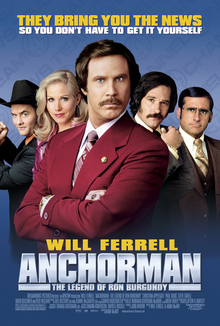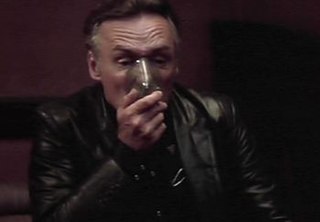Related Research Articles
A quotation is the repetition of a sentence, phrase, or passage from speech or text that someone has said or written. In oral speech, it is the representation of an utterance that is introduced by a quotative marker, such as a verb of saying. For example: John said: "I saw Mary today". Quotations in oral speech are also signaled by special prosody in addition to quotative markers. In written text, quotations are signaled by quotation marks. Quotations are also used to present well-known statement parts that are explicitly attributed by citation to their original source; such statements are marked with quotation marks.

She Done Him Wrong is a 1933 pre-Code American crime/comedy film starring Mae West and Cary Grant, directed by Lowell Sherman. The plot includes melodramatic and musical elements, with a supporting cast featuring Owen Moore, Gilbert Roland, Noah Beery Sr., Rochelle Hudson, and Louise Beavers. The film was adapted from the successful 1928 Broadway play Diamond Lil by Mae West. The film is famous for West's many double entendres and quips, including her best-known "Why don't you come up sometime and see me?". She Done Him Wrong was a box-office success and the film was nominated for the Academy Award for Best Picture.

A Night at the Opera is a 1935 American comedy film starring the Marx Brothers, and featuring Kitty Carlisle, Allan Jones, Margaret Dumont, Sig Ruman, and Walter Woolf King. It was the first of five films the Marx Brothers made under contract for Metro-Goldwyn-Mayer after their departure from Paramount Pictures, and the first after Zeppo left the act. The film was written by George S. Kaufman and Morrie Ryskind from a story by James Kevin McGuinness, with additional uncredited dialogue by Al Boasberg. The film was directed by Sam Wood.

"Stinkin' badges" is a paraphrase of a line of dialogue from the 1948 film The Treasure of the Sierra Madre. That line was in turn derived from dialogue in the 1927 novel of the same name, which was the basis for the film.

Anchorman: The Legend of Ron Burgundy is a 2004 American satirical comedy film directed by Adam McKay in his directorial debut, produced by Judd Apatow, starring Will Ferrell and Christina Applegate and written by McKay and Ferrell. The first installment in the Anchorman series, the film is a tongue-in-cheek take on the culture of the 1970s, particularly the new Action News format. It portrays a San Diego television station where Ferrell's title character clashes with his new female counterpart.

In a Lonely Place is a 1950 American film noir directed by Nicholas Ray and starring Humphrey Bogart and Gloria Grahame, produced for Bogart's Santana Productions. The script was written by Andrew P. Solt from Edmund H. North's adaptation of Dorothy B. Hughes' 1947 novel of the same name.

A blurb is a short promotional piece accompanying a piece of creative work. It may be written by the author or publisher or quote praise from others. Blurbs were originally printed on the back or rear dust jacket of a book. With the development of the mass-market paperback, they were placed on both covers by most publishers. Now they are also found on web portals and news websites. A blurb may introduce a newspaper or a book.

Sherilyn Fenn is an American actress. She played Audrey Horne on the television series Twin Peaks for which she was nominated for a Golden Globe Award and an Emmy Award.

"Beam me up, Scotty" is a catchphrase and misquotation that made its way into popular culture from the science fiction television series Star Trek: The Original Series. It comes from the command Captain Kirk gives his chief engineer, Montgomery "Scotty" Scott, when he needs to be "transported" back to the Starship Enterprise.
Part of the American Film Institute's 100 Years... series, AFI's 100 Years... 100 Movie Quotes is a list of the top 100 quotations in American cinema. The American Film Institute revealed the list on June 21, 2005, in a three-hour television program on CBS. The program was hosted by Pierce Brosnan and had commentary from many Hollywood actors and filmmakers. A jury consisting of 1,500 film artists, critics, and historians selected "Frankly, my dear, I don't give a damn", spoken by Clark Gable as Rhett Butler in the 1939 American Civil War epic Gone with the Wind, as the most memorable American movie quotation of all time.

"I'll be back" is a catchphrase associated with Arnold Schwarzenegger. It was made famous in the 1984 science fiction film The Terminator. On June 21, 2005, it was placed at No. 37 on the American Film Institute list AFI's 100 Years... 100 Movie Quotes. Schwarzenegger uses the same line, or some variant of it, in many of his later films.

Mabel "Madea" Earlene Simmons is a character created and portrayed by Tyler Perry. She is portrayed as a tough, street-smart elderly African-American woman.

Frank Booth is a fictional character and the main antagonist in David Lynch's 1986 psychological thriller Blue Velvet, portrayed by Dennis Hopper. A violent drug-dealer, he has kidnapped the family of lounge singer Dorothy Vallens, holding them hostage in order to force her into becoming his sex slave. Their encounters are characterized by Frank huffing an unknown gas from a tank he carries with him. This causes him to exhibit a split personality between two individuals he identifies as "Baby" and "Daddy", whose personas he assumes to engage in acts of ritualistic rape. One of Frank's associates is a police detective nicknamed "The Yellow Man", who helps Frank by killing rival drug-dealers. The Yellow Man later steals their supplies from the evidence room, so Frank can sell them himself.

"Go ahead, make my day" is a catchphrase from the 1983 film Sudden Impact, spoken by the character Harry Callahan, played by Clint Eastwood. The iconic line was written by John Milius, whose writing contributions to the film were uncredited, but has also been attributed to Charles B. Pierce, who wrote the film's story, and to Joseph Stinson, who wrote the screenplay. In 2005, it was chosen as No. 6 on the American Film Institute list AFI's 100 Years...100 Movie Quotes.

The Treasure of the Sierra Madre is a 1948 American Neo-Western film written and directed by John Huston, and starring Humphrey Bogart, Tim Holt, Bruce Bennett, and Walter Huston - the director's father. Based on B. Traven's 1927 novel of the same name, the film follows two downtrodden men who join forces with a grizzled old prospector, in searching for gold in Mexico.
"Houston, we have a problem" is popularly misquoted as a phrase spoken during Apollo 13, a NASA mission in the Apollo space program and the third meant to land on the Moon. After an explosion occurred on board the spacecraft en route to the Moon at 55:54:53, Jack Swigert, the command module pilot, reported to Mission Control Center in Houston, Texas: "Okay, Houston ... we've had a problem here." After being prompted to repeat his words by Jack R. Lousma, the capsule communicator at Mission Control, Jim Lovell, the mission commander, responded: "Ah, Houston, we've had a problem."
Jessica Rabbit is a fictional character in the novel Who Censored Roger Rabbit? and its film adaptation, Who Framed Roger Rabbit. She is depicted as the human toon wife of Roger Rabbit in various Roger Rabbit media. Jessica is renowned as one of the best-known sex symbols in animation. She is best remembered for the line: "I'm not bad, I'm just drawn that way".

Veni, vidi, vici is a Latin phrase used to refer to a swift, conclusive victory. The phrase is popularly attributed to Julius Caesar who, according to Appian, used the phrase in a letter to the Roman Senate around 47 BC after he had achieved a quick victory in his short war against Pharnaces II of Pontus at the Battle of Zela.
Dancing on the Moon is a 1935 animated film directed by Dave Fleischer and part of the Color Classics series of animated short films produced by Fleischer Studios.
References
- 1 2 3 4 5 6 7 Justin Thomas Kay (January 15, 2010). "Movie Misquotations". The New York Times .
- ↑ "Laurel and Hardy: 40 funny moments". The Daily Telegraph . January 18, 2016.
- 1 2 3 Brian Galindo (May 1, 2013). "20 Famous Movie Lines That You Have Been Saying Wrong". BuzzFeed.
- 1 2 3 4 5 6 7 8 9 10 Lexy Perez (June 30, 2017). "From 'Star Wars' to 'Jaws': 22 Films That Are Famously Misquoted". The Hollywood Reporter .
- 1 2 3 Stacy Conradt (July 31, 2018). "10 Famous Movie Lines You're Probably Misquoting". Mental Floss .